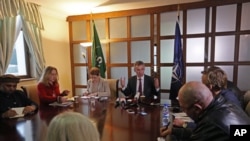The head of NATO on Wednesday predicted a difficult fight ahead for Afghanistan as the government continues to battle the Taliban and other militant factions trying to assert their presence in the war-ravaged country.
Jens Stoltenberg, NATO's secretary general, said insurgents will press their fight against Kabul in what is likely to be another tough year for the Afghan government. He spoke to The Associated Press during a two-day visit to Kabul, his second since taking the top NATO role in late 2014.
The Taliban, al-Qaida and the Islamic State group will keep up their attacks across Afghanistan throughout 2016, he said.
"We have seen different terrorist organizations trying to establish themselves in Afghanistan," he said. "We have seen the presence of al-Qaida, IS, the Taliban and all the groups, and they are still in Afghanistan."
"There is going to be continued fighting and we have to expect that there are going to be new attacks on the government forces," he added.
NATO has around 3,000 troops in Afghanistan, in the so-called Resolute Support non-combat mission along with about 9,800 U.S. soldiers. The mission was pared down in 2014, with the departure of most international combat troops, leaving Afghan forces to take on the insurgency largely alone.
For now, the United States will halve troop numbers at the end of this year. Stoltenberg said NATO's numbers for 2017 are not yet clear. The use of U.S. airstrikes to back Afghan forces has been critical in helping them hold ground and can push Taliban and other insurgent groups out of contested areas.
The Taliban were well-prepared for the end of the U.S.-NATO combat mission and swiftly intensified their insurgency, now in its 15th year. Officials have said that Afghan forces suffered almost 30 percent more deaths and casualties in 2015 than the estimated 5,000 of the year before.
There have been no official figures released on those casualties.
The U.N. mission in Afghanistan says more than 11,000 civilians were killed and wounded last year, many of them women and children caught in the crossfire.
Afghan President Ashraf Ghani said this week that the extremists from an Islamic State affiliate that had gained a foothold in the east last year, with ambitions to move north toward the Central Asia states, were now "on the run" following military operations.
Analysts, however, dispute that assessment, and also point to the spread in the north by the Taliban and other Islamic militants.
Nevertheless, Stoltenberg was upbeat in his praise for Afghan forces and said NATO efforts would focus on Kunduz in the north and Helmand in the south, where the Taliban are fighting to hold lucrative routes for smuggling men, guns, drugs, alcohol and minerals.
A dire assessment was also expressed by the U.N. mission chief in Afghanistan, Nicholas Haysom, who on Tuesday told the U.N. Security Council that the Afghan government was fighting for its survival amid surging militants.
Unless the government overcame "five distinct hurdles" it would face "severe consequences," Haysom said, listing a contracting economy, intensifying insurgency, fractious political environment as well as desperately needed funding from the international community and the need to demonstrate progress toward a sustainable peace.
"For 2016, survival will be an achievement," Haysom said at the U.N.
Ghani's government is hoping to draw the Taliban into a dialogue aimed at formal peace talks, but a face-to-face meeting between representatives of both sides that had been expected earlier this month has yet to be set. The Taliban said last week they would not participate.
Meanwhile, violence continues to kill and wound civilians and Afghan security forces. In Kunar province, bordering Pakistan, a woman and three of her children died when a rocket landed on their home in the Ghazi Abad district early Wednesday, the provincial police chief, Faridullah Dehqaan said.
Further south, in Nangarhar province, also bordering Pakistan, an attack by militants loyal to IS left six policemen "killed or wounded," the provincial governor's spokesman Ataullah Khogyani said. The attack on their checkpoint took place around 2am Wednesday, he said.




